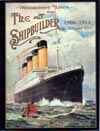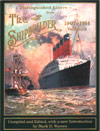|
| To Search This Site Enter Key Words Into Text Field On The Right and Hit The Search Button |
|
|
Books Beyond Titanic: Mark Warren.
 |
Warren, Mark D (editor). Distinguished Liners from the Shipbuilder 1906-1914, Volume 1. 1st printing thus. New York: Blue Riband Publications. June? 1995. hardcover. isbn: 0964815303. scarcity: fairly common.
The original Shipbuilder magazine, now known as Shipping World and Shipbuilder, has long been known as one of the most prestigious journals covering the science of shipbuilding. It was first issued in 1906, and chronicled the building, launching and outfitting of the latest ships of the time in exquisite detail. The original articles were predominantly about ocean liners, and Warren keeps this focus in the selection of ships covered in his two books.
The volume of technical information that graced the pages of the Shipbuilder was just astounding. Just about every aspect of these ships was covered, from technical cutaways of engine spaces to the latest amenities adopted for the comfort of the passengers and crews. Each article typically begins with the name of the company the ship was being built for, the shipyard doing the construction, and the overall specifications of the vessel, including tonnage, length, speed, passenger capacity, etc.
Longer articles go into specific details of much of the machinery in these vessels, from the engines to watertight compartments to lifeboats. Further details cover everything from the kitchen arrangements to the various passenger accommodations available, though usually with an emphasis on the first class sections of the ships. The reporters seemingly had direct access to the management of the shipping companies and the shipbuilding firms, making for an extraordinary degree of detail.
Sprinkled throughout the articles are wonderful drawings and actual photographs of the ships and their interior spaces. There is also a wealth of deck plans, cutaways and diagrams, making these articles a visual treat as well.
Warren has culled through many original issues and selected some of the best articles to grace the pages of his book. All together he covers in varying detail 41 vessels including the France, the Rotterdam, the Cameronia, the Adriatic, the Laurentic, the Empress of Russia and the Empress of Ireland, amongst others. Of necessity the amount of coverage varies considerably from a one page description of the President Lincoln to a glowing 16 page report on the Reina Victoria-Eugenia, just to give two examples.
Four ships receive special emphasis. The story of the Mauretania and Lusitania is covered in 66 pages, and Olympic and Titanic are described over 29 pages. Six of the fold-out plates detail Olympic/Titanic, while five others show Mauretania/Lusitania. The photographic selection included of these four ships is terrific, covering all phases, from construction to fitting out, launching, and interiors.
A special treat is the reprinting of many of the original advertisements which first appeared in the magazines. These ads cover a wide range of equipment from light fixtures to Welin davits and offer a rare look at the equipment various companies were advertising to shipbuilders just after the turn of the century. There is a complete index to all the ads as well, a useful touch.
|
 |
Warren, Mark D (editor). Distinguished Liners from the Shipbuilder 1907-1914, Volume 2. 1st printing thus. New York: Blue Riband Publications. April? 1997. hardcover. isbn: 0964815311. scarcity: hard to find.
In this second volume, the author covers an additional 53 ships including the Franconia, the Kaiser Franz Joseph I, the Vestris, the Britannic, the Alsatian, the Cap Trafalgar, the Vaterland and the Bismarck amongst many others.
The two ships with the most prominent coverage in this volume is Imperator and Aquitania. The Aquitania chapter has five fold-out plates detailing complete deck plans as well as some of the engineering spaces.
As in the first volume, the author reprints many of the advertisements from the original Shipbuilder magazines. There are about 100 ads in volume two.
These two books are a treasure-trove of technical information about the advancements in ship design as each new, improved liner was launched and entered service. They are an invaluable addition to anyone’s nautical library, particularly to those who are interested in the evolution of the great liners.
|
|
|
|
|